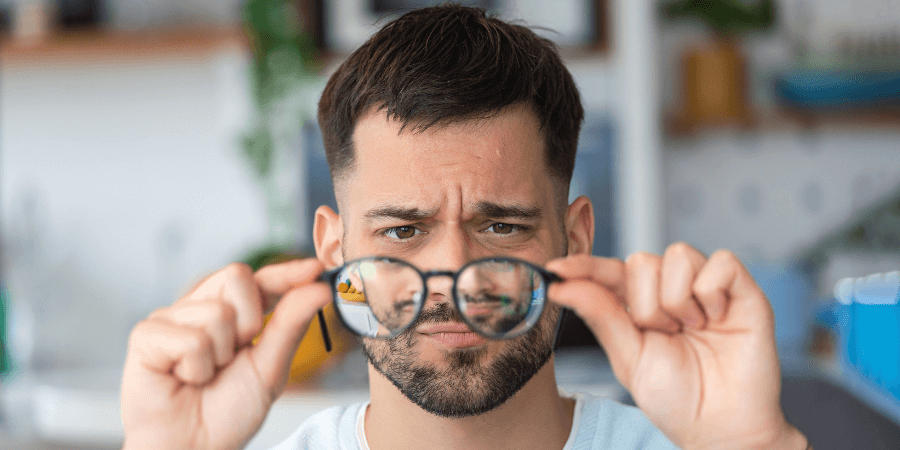Ever felt like you’re starring in your own personal sci-fi flick when headlights blind you while driving at night? Or, have you ever tossed and turned in bed, haunted by the ghostly glow of your late-night screen time? If that’s a yes, it might just be that your trusty spectacles aren’t pulling their weight. In our screen-saturated world, there’s a smorgasbord of lens coatings designed to keep your peepers comfy and your vision sharp.
When you’re out shopping for eyewear, you might stumble across jargony gems like “anti-glare” and “blue light filter” coatings. Each has its superpowers, but they serve different masters. Let’s dive into what these coatings do and how to pick the right one for your lifestyle.
What’s the deal with Anti-reflective lenses?
Ever been annoyed by the dazzling light shows courtesy of car headlights or those pesky reflections off your glasses? Enter anti-glare, or as the cool kids say, anti-reflective (AR) coatings. These wizard-like layers work like a charm to banish those distracting glares.
How? Imagine a superhero’s shield, but it’s microscopic and made of metal oxides. This thin layer lives on your lenses, slashing glare and reflections from incoming light, letting more of it through to your eyes for clearer nighttime adventures.
Perks of Anti-glare glasses:
-
They let in heaps of light (99.5%, to be precise), making everything crystal clear.
-
Perfect for shutterbugs: say goodbye to reflections in your photos.
-
They minimize glare, so your eyes don’t have to work overtime, keeping things sharp and comfy during all your escapades.
What about blue-blocking lenses?
Ever glued yourself to your phone or laptop, only to find sleep elusive later? That pesky blue light could be your nemesis.
Our beloved digital devices spew out loads of blue light, which, despite being a component of sunshine, is a troublemaker at night, sabotaging our sleep by messing with melatonin, our body’s bedtime signal.
Blue light-blocking glasses are like your personal night guards, blocking this sleep-stealing light. They come armed with a special coating that shields your eyes from the blue blitz, potentially sparing you from eye strain and restless nights.
Why snag blue-light-blocking glasses?
-
They’re like a spa for your eyes, reducing strain for those marathon screen sessions.
-
Promote zzz’s: Blocking blue light at night could help you drift off faster and snooze more soundly.
Choosing between Anti-Reflective and Blue-Light lenses:
-
Anti-Glare Lenses: Best for night owls and glare haters. They clear up your vision by cutting out annoying glares.
-
Blue Light Blocking Lenses: Ideal for night-time Netflixers or anyone glued to screens when it’s starry out. They help keep your eyes relaxed and your sleep schedule on track.
So, which superhero coating should you choose?
It depends on your daily drama. Anti-reflective coatings are a boon for those who drive at night or spend lots of time outdoors. If you’re practically married to your screens, consider blue light blockers to help keep your eyes and sleep in check.
Why choose, though? You can double up and have both coatings on your specs for the ultimate eye protection. Companies like Specscart even throw in a free anti-glare coating on all their glasses, making it a steal since in this day and age, seeing clearly shouldn’t be a luxury—it’s a must. Similarly, considering our tech-tied lives, blue light blockers are equally essential.
Why not treat your eyes to the best of both worlds and opt for a combo that lets you enjoy clear vision and peaceful slumbers? That way, you can keep binging your favorite shows and driving under starlit skies without a hitch!
Know more about Anti-Reflective Lenses
-
What are anti-glare lenses? Anti-glare lenses, also known as anti-reflective lenses, are coated with a thin layer of metal oxides to reduce glare from light sources, enhancing visibility especially during night driving or in brightly lit environments.
-
How do blue light-blocking glasses work? Blue light-blocking glasses are equipped with a special coating that filters out the blue light emitted by digital devices. This helps reduce eye strain and can improve sleep quality by minimizing blue light exposure in the evenings.
-
Can I get glasses with both anti-glare and blue light-blocking coatings? Yes, many brands offer glasses that combine both anti-glare and blue light-blocking coatings, providing comprehensive protection from glare and blue light, which is ideal for both day and night usage.
-
What are the benefits of anti-glare glasses? Anti-glare glasses enhance vision clarity by allowing more light to pass through the lenses and reducing reflections. This makes them especially useful for driving at night and for photographers who want to avoid lens reflections.
-
Who should consider blue light-blocking lenses? Blue light-blocking lenses are recommended for individuals who spend a lot of time on screens, particularly in the evenings, as they help reduce eye strain and promote better sleep by regulating melatonin production.




